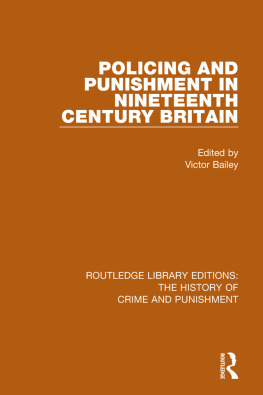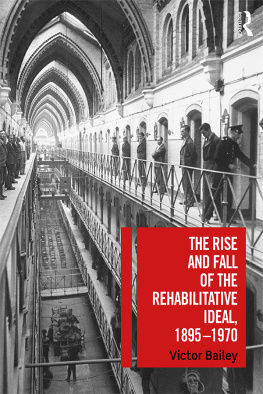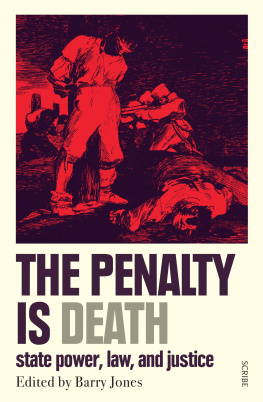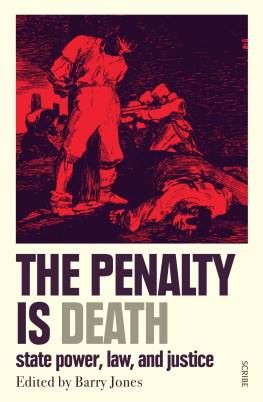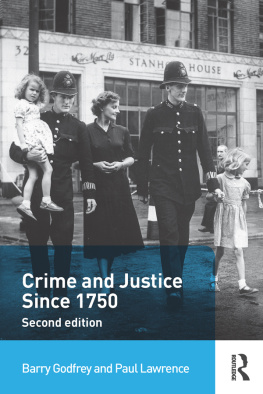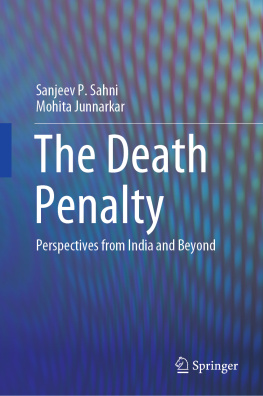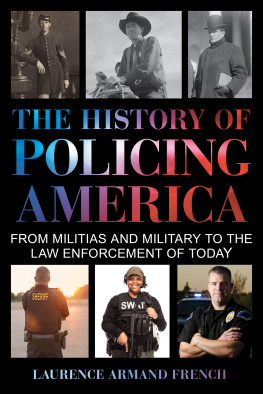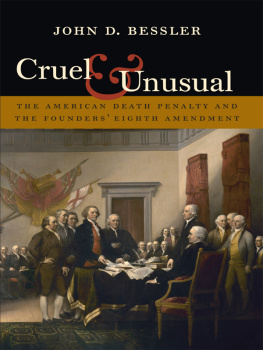ROUTLEDGE LIBRARY EDITIONS: THE HISTORY OF CRIME AND PUNISHMENT
Volume 1
POLICING AND PUNISHMENT IN NINETEENTH CENTURY BRITAIN
Policing and Punishment in Nineteenth Century Britain
Edited by
Victor Bailey
First published in 1981
by Croom Helm Ltd
This edition first published in 2016
by Routledge
2 Park Square, Milton Park, Abingdon, Oxon OX14 4RN
and by Routledge
711 Third Avenue, New York, NY 10017
Routledge is an imprint of the Taylor & Francis Group, an informa business
1981 Victor Bailey
All rights reserved. No part of this book may be reprinted or reproduced or utilised in any form or by any electronic, mechanical, or other means, now known or hereafter invented, including photocopying and recording, or in any information storage or retrieval system, without permission in writing from the publishers.
Trademark notice : Product or corporate names may be trademarks or registered trademarks, and are used only for identification and explanation without intent to infringe.
British Library Cataloguing in Publication Data
A catalogue record for this book is available from the British Library
ISBN: 978-1-138-94552-4 (Set)
ISBN: 978-1-315-67131-4 (Set) (ebk)
ISBN: 978-1-138-94223-3 (Volume 1) (hbk)
ISBN: 978-1-315-67301-1 (Volume 1) (ebk)
Publisher's Note
The publisher has gone to great lengths to ensure the quality of this reprint but points out that some imperfections in the original copies may be apparent.
Disclaimer
The publisher has made every effort to trace copyright holders and would welcome correspondence from those they have been unable to trace.
Policing and Punishment in Nineteenth Century Britain
EDITED BY VICTOR BAILEY
1981 Victor Bailey
Croom Helm Ltd, 2-10 St John's Road, London SW11
British Library Cataloguing in Publication Data
Policing and punishment in nineteenth-century Britain.
1. Police England - History 2. Crime and criminals - England - History 3. Punishment - England - History
I. Bailey, Victor
363.2'0942 HV8196
ISBN 0-7099-0626-9
Printed and bound in Great Britain by
REDWOOD BURN LIMITED
Trowbridge & Esher
Contents
This is the third volume to be produced by a staff/student co-operative within the Centre for the Study of Social History at the University of Warwick. I wish it as much success as its predecessors, Albion's Fatal Tree (1975) and The Independent Collier (1978). A fourth volume, Workmen of Our Class, is in advanced preparation while a fifth has already taken a hold upon the imagination of the prospective contributors. The fears that these enterprises might divert students' attention away from completing their theses or dissertations, or that they might hinder students from publishing full-scale books on their own account, appear to be without foundation.
So far as I am aware the notion of a staff/student literary co-operative is unique to Warwick and it may be worthwhile to list the essential conditions for its success. First, money but not nearly as much of it as might be imagined. These volumes have cost nothing to the 'research' funds of the Social Science Research Council. They have been largely funded out of a generous allocation of 'studentships' from that quarter for which I am suitably grateful. But, second, a co-operative requires more than a large number of students. Bigness is fully compatible with miscellany and the sense of isolation and neglect which so often accompanies miscellany. There must be an attempt to go beyond what E.P. Thompson, my predecessor as Director of the Centre, called an 'artisanal research culture'. One must seek out certain concentrated and interrelated areas of research. One must have an eye to these possibilities when deciding to whom awards shall be given. The student must be enabled to be himself or herself, but in company. One must be prepared to learn from the laboratory, but by critical observation only. Third, one needs a sense of discovery: a 'nose' for what ought to be going on in social history. (In this instance I take it to be an awareness of the interplay between patterns of lawlessness and of law enforcement, or perhaps the immoral economy of crowd control!)
In certain minor respects this volume is not obviously in the line of descent from the Tree and the Collier. For example, there are three valued contributions from scholars who are not students, or former students, at the Centre. Then again, the 'staff' contribution appears to be limited to this brief foreword. However, Dr Bailey would be the first to acknowledge that the whole project owes an immense debt to Mr Michael Shepherd, formerly lecturer in social history at Warwick. Nor is his the only 'invisible hand'. Dr David Wilson was prevented by his professional duties from appearing in the following pages. Yet most of the members of the co-operative must be well aware of his constructive role in the making of this book. But then to be a good co-operator may require anonymity, long periods of uninterrupted silence and a well developed bump of humility.
Royden Harrison
We all acknowledge gratefully help from the staffs of the Public Record Office, the British library, the Bodleian Library, the Library of Warwick University and the Birmingham Reference Library. We are obliged to the Controller of Her Majesty's Stationery Office for permission to make use of Crown Copyright material in the Public Record Office. We have been assisted in many ways by Royden Harrison, Tony Mason, Michael Shepherd, David Wilson, Sarah McCabe, and V.A.C. Gatrell. We are grateful also to Terry Sharman for typing and secretarial assistance.
In addition, some contributors wish to acknowledge particular assistance: Victor Bailey to Sheila Blackburn, Sheridan Gilley, Peter Lawson, Kenneth O. Morgan and Sir Leon Radzinowicz for their criticisms, Mr. H.G. Pearson, for permission to consult Home Office and Metropolitan Police papers, and the Institute of Historical Research for the grant of a research fellowship, which enabled him to complete the work; Peter Bartrip to the staffs of the D.M.S. Watson Library, University College, London, and R.M. Hartwell and U.R.Q. Henriques for their criticisms; John Field to the staff of the Portsmouth City Record Office. Margaret DeLacy wishes to thank members of seminars at the Institute of Historical Research and the University of Reading, and the staffs of the Lancashire County Record Office, the Lancaster City Library and Museum, the Cultural Services Department of the City of Manchester and H.M. Prisons at Preston and Lancaster. She was assisted in many particular ways by Mr. K. Neale and Mr. M. Butters of the Home Office Prison Department, Robin Evans, Michael Ignatieff and Joanna Innes. Janet Saunders wishes to thank the staff of the Warwick County Record Office, and Dr T.L. Dunn, Consultant Physician at the Central Hospital, Hatton, for permission to use the records of the Warwick County Lunatic Asylum.
Victor Bailey
In the years between 1750 and 1868, English criminal justice underwent significant changes. The two most crucial developments were the gradual establishment of an organised, regular police, and the emergence of new secondary punishments, following the restriction in the scope of the death penalty. In place of an ill-paid parish constabulary, functioning largely through a system of rewards and common informers, and often depending on the backing of local para-military forces and the army, professional police institutions were given the task of executing a speedy and systematic enforcement of the criminal law. In lieu of the severe and capriciously-administered capital laws, given renewed legitimacy by Paley's doctrine of maximum severity and discretionary selection, a penalty structure relating the gravity of the crime to the severity of the punishment was erected as arguably a more effective deterrent of crime. Accordingly, the death penalty made way for penal transportation, 'that great sewer which for so many years carried away the dregs of our population', in M.D. Hill's evocative words, and for indigenous prison establishments.

